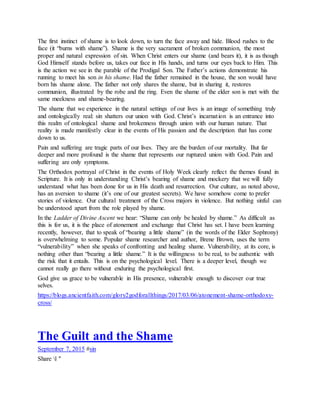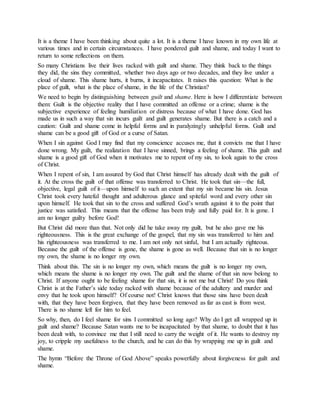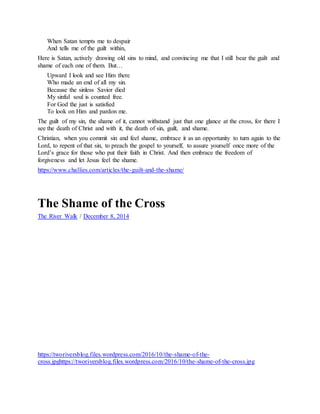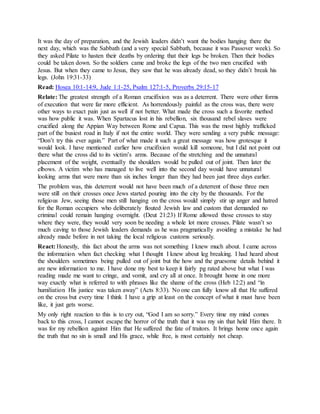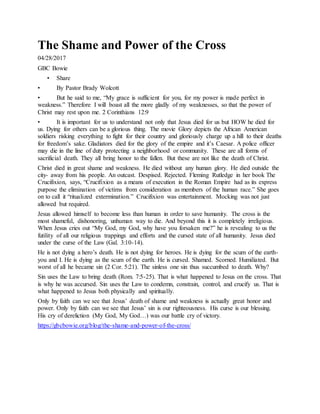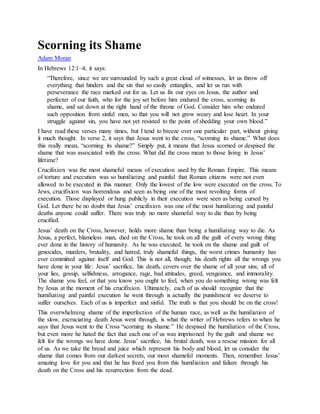The document reflects on the profound suffering and shame endured by Jesus Christ, focusing on His noble nature and the depths of His love for humanity. It emphasizes the paradox of His divine glory versus the humiliation of His crucifixion, illustrating how His accusations, mockery, and ultimately, the shameful death He endured reveal the breadth of His sacrificial love. The discussion draws on biblical references, particularly Hebrews 12:2, to highlight the importance of recognizing Christ's shame as a central aspect of understanding His redemptive work.
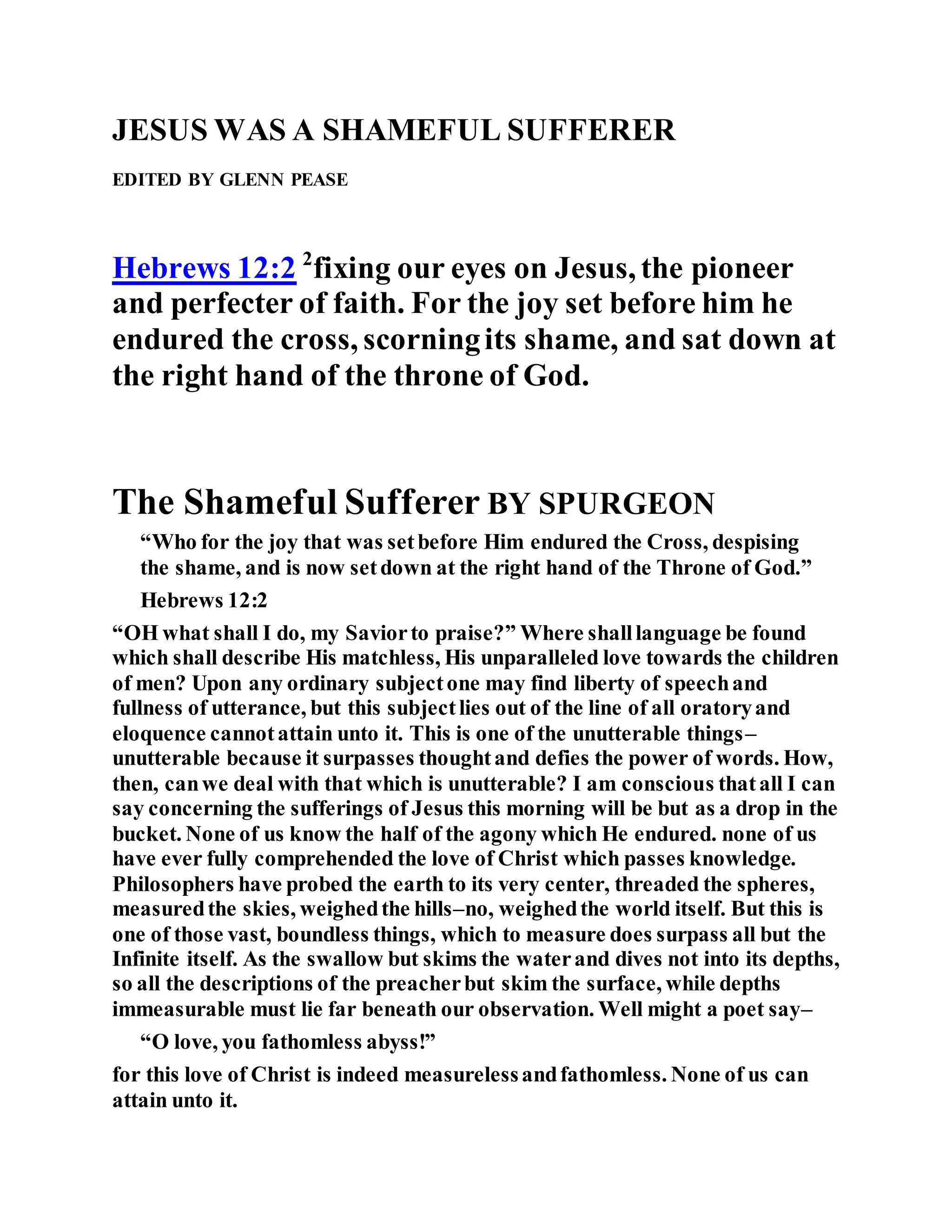
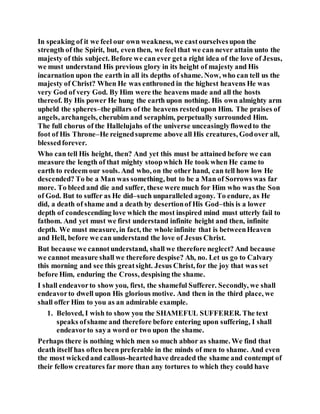
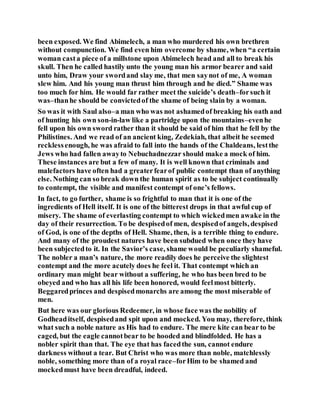
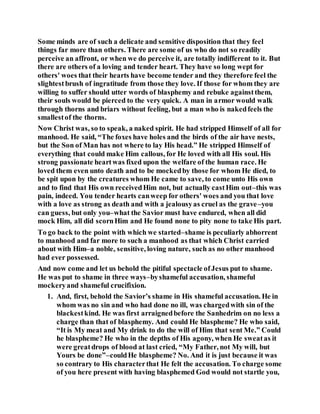
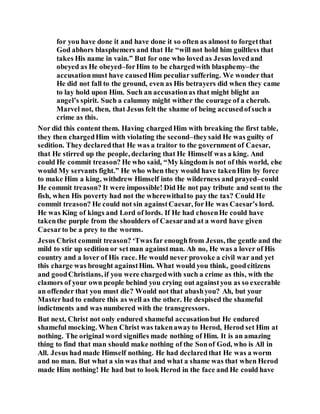
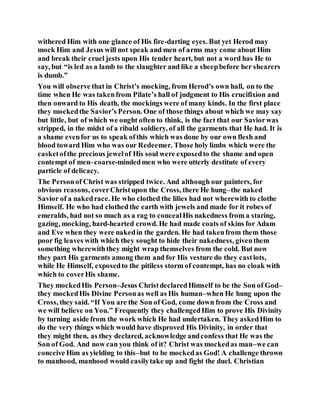
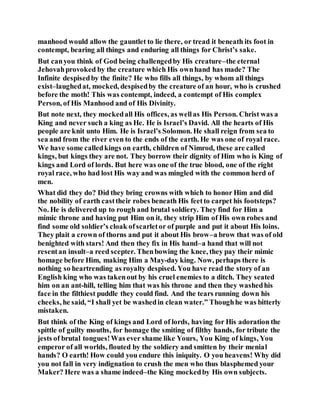
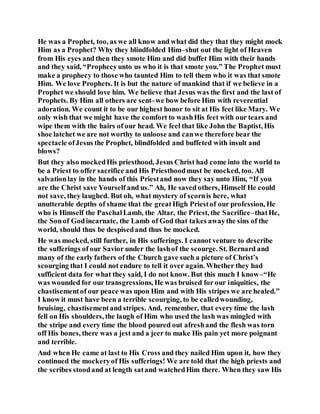
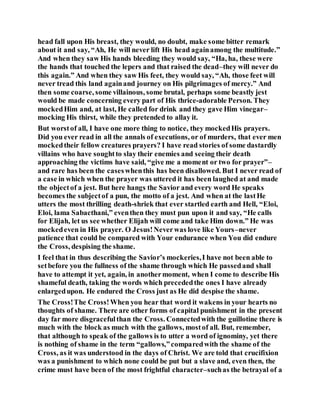
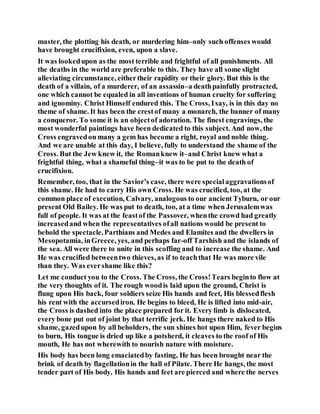
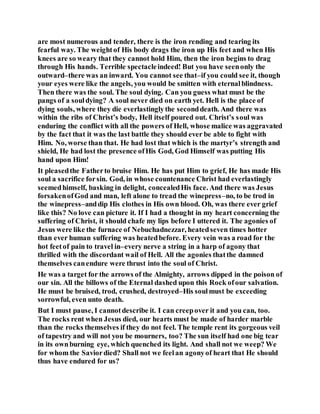
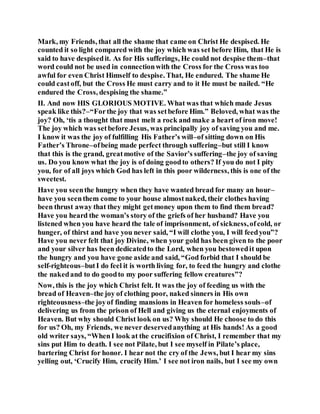
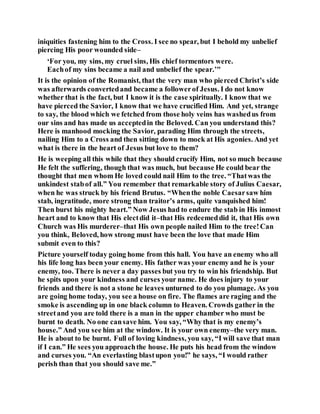
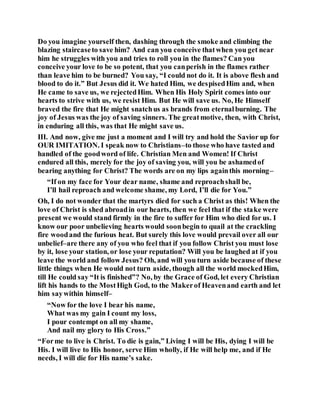
![[Mr. Spurgeon was so led out under the first head, that he was unable from
want of time to touch upon the other points. May what was blessedto the
hearer be sweetto the reader.]
Christ as a Sufferer
J. Stalker, D.D.
Isaiah 53:3-7
He is despised and rejected of men; a man of sorrows, and acquainted with
grief: and we hid as it were our faces from him…
1. Jesus sufferedfrom what may be called the ordinary privations of
humanity. Born in a stable, etc. We may not be able to assertthat none ever
suffered so much physical agonyas He, but this is at leastprobable; for the
exquisiteness of His physical organism in all likelihood made Him much more
sensitive than others to pain.
2. He suffered keenly from the pain of anticipating coming evil.
3. He suffered from the sense ofbeing the cause ofsuffering to others. To
persons of an unselfish disposition the keenestpang inflicted by their own
weakness ormisfortunes may sometimes be to see those whom they would like
to make happy rendered miserable through connectionwith themselves. To
the child Jesus how gruesome must have been the story of the babes of
Bethlehem, whom the sword of Herod smote when it was seeking forHim! Or,
if His mother spared Him this recital, He must at leasthave learned how she
and Josephhad to flee with Him to Egypt to escape the jealousyof Herod. As
His life drew near its close, this sense that connectionwith Himself might be
fatal to His friends forceditself more and more upon His notice.
4. The element of shame was, all through, a large ingredient in His cup of
suffering. To a sensitive mind there is nothing more intolerable; it is far
harder to bear than bodily pain. But it assailedJesusin nearly every form,](https://image.slidesharecdn.com/jesuswasashamefulsufferer-200222145625/85/Jesus-was-a-shameful-sufferer-15-320.jpg)
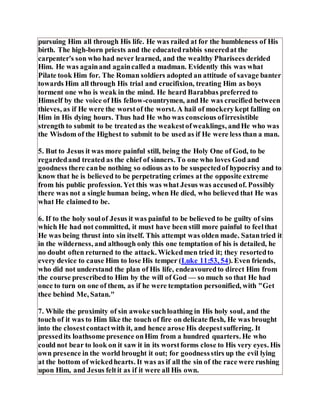
![(J. Stalker, D.D.)
What Does It Mean for Jesus to Despise
Shame?
john-piper
Founder & Teacher, desiringGod.org
In running the race of life we are to look to the exaltationof Jesus at the end
of his race. But Hebrews 12:2 tells us to look not only to his exaltation, but to
his motivation.
Jesus was carriedin the agonies ofthe last lap of his race by the hope of joy.
“Forthe joy that was setbefore him [he] endured the cross, despising the
shame” (verse 2). Jesus kepthis eyes on the same place we should — his own
future exaltation at the Father’s right hand, with the completion of our
salvationcrowning his head. This was his joy.
There were mammoth obstacles in Jesus’s way. Two are mentioned. The cross
and the shame. The cross, no doubt, stands for all the pain and abandonment
and spiritual darkness ofthose hours, as he lunged, dying, to the finish line.
But shameis the one agonyof the cross whichthe author mentions. And he
said that Jesus despised it. That is an amazing choice of words. Would you
have chosensuch a word to say he overcame shame? He despisedit.
Shame was stripping awayevery earthly support that Jesus had: his friends
gave way in shaming abandonment; his reputation gave way in shaming
mockery;his decencygave way in shaming nakedness;his comfort gave way
in shaming torture. His glorious dignity gave way to the utterly undignified,
degrading reflexes of grunting and groaning and screeching.
And he despisedit. What does this mean?
It means Jesus spoke to shame like this:
“Listen to me, Shame, do you see that joy in front of me? Comparedto that, you
are less than nothing. You are not worth comparingto that! I despise you. You](https://image.slidesharecdn.com/jesuswasashamefulsufferer-200222145625/85/Jesus-was-a-shameful-sufferer-17-320.jpg)
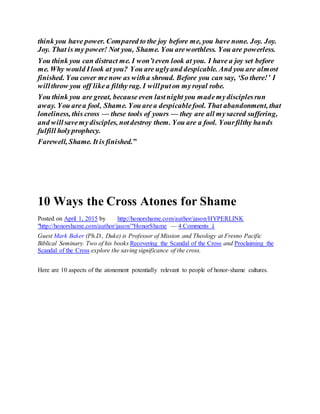
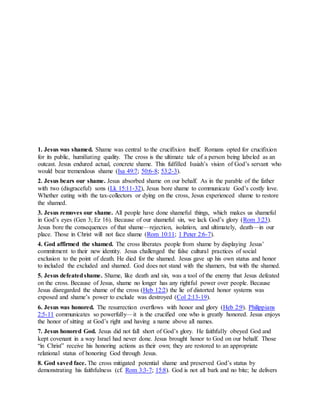

![Posted in Missiology, NT, Theology Tagged with: atonement, cross, death, Honor, Jesus, shame
4 comments on “10Ways the Cross Atones for Shame”
1. Steve Hoke says:
2. April 1, 2015 at 5:04 pm
3. Great stuff, brother Mark. THis helps us see how to apply the H/S worldview in
incredibly practical ways. Thanks for this help! God bless you as you share the Scandal!
Steve Hoke
4. Reply
5. Werner Mischke says:
6. April 1, 2015 at 5:37 pm
7. Amen and amen. This is a message for our time and our world.
8. Reply
9. Melinda says:
10. April 4, 2015 at 2:43 am
11. It seems as though there was quite a bit of cultural belief tied to the
cross/crucifixion that is today unfamiliar to Westerners, and not easy for them to
understand. Thank you for this. It’s a helpful piece.
12. Reply
13. Raymond Balogun says:
14. October 6, 2018 at 1:04 am
15. Great interpretation and tremendous inspirational message on the atoning power
of our Lord and Saviour Jesus Christ. God bless you sir. Raymond Balogun from Nigeria.
16. Reply
1 Pings/Trackbacks for "10Ways theCross Atones for Shame"
1. How A Culture Of Shame Puts Us In Bondage And How We Can Find Freedom From
Shame – Renewed and Transformed says:
2. October 28, 2016 at 1:16 am
3. […] scorning its shame, and sat down at the right hand of the throne of God”
(Hebrews 12:2). HERE is a link to “10 Ways the Cross Atones for Shame” by Mark […]](https://image.slidesharecdn.com/jesuswasashamefulsufferer-200222145625/85/Jesus-was-a-shameful-sufferer-21-320.jpg)
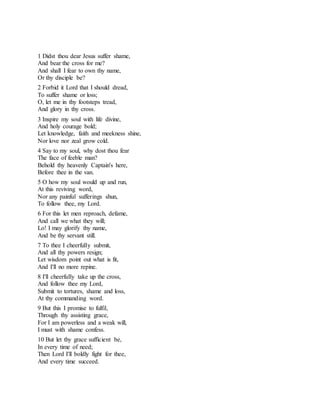
![Divine Hymns, or Spiritual Songs: for the use of religious assemblies and private Christians
1800
All representative texts • Compare textsHYPERLINK l "^ top
Author: James Maxwell
Maxwell, James , was born in Renfrewshire in 1720. In his youth he journeyed to England with a
hardware pack, but eventually returning to Scotland, he followed the joint occupation of
schoolmaster and poet. In 1783, during a famine in Scotland he was reduced to great destitution,
and had to earn his bread by breaking stones on the highway. Most of his publications (from 30
to 40 in all) were produced after that period. The two works in which we are interested are:— (1)
Hymns and Spiritual Songs. In Three Books. 1759. (2) A New Version of the whole of the Book
of Psalms in Metre; by James Maxwell, S. D. P. [Student of Divine Poetry.] Glasgow, 1773.
From the former of these the following hymns are in common use:— 1. All glory to t… Go to
person page >
SHAME OF THE CROSS
Honor and shame were very important categories in antiquity, so a second element, a more
interior suffering, a more internal suffering associated with the cross was the shame of being
crucified, the shame of crucifixion. In fact, Cicero, a famous Roman rhetorician, talked about the
cross as “the tree of shame.” So he can actually call it “the tree of shame.” And the reason it was
regarded as such was because crucifixion specifically a punishment for slaves. Seneca calls it
“the extreme and ultimate penalty for a slave” and Valerius Maximus calls it “the slaves’
punishment.”
So again, I mentioned Saint Paul and his death by beheading in Rome during the persecution of
Nero—the reason he received that more merciful form of execution was because he was a
Roman citizen, whereas St. Peter, Bishop of Rome, was a Jew from Judea. He was an immigrant
to Italy, to Rome, and so he suffered the penalty of a non-citizen of crucifixion — although he
asked to be crucified upside down. Think about how that exacerbated the torture because he
didn’t feel worthy of being crucified in the exact same way as his Lord.
So this death is meant to shame you. It’s meant to mock you. It’s meant to embarrass you in front
of everyone, okay? And if you’ve ever been really, really embarrassed, you know the pain of
embarrassment cuts deeply if it’s a serious one, yes, right? But it’s an interior suffering. So that’s
what we would call an embarrassment; they would call it shame. It’s deeper than just being
embarrassed. And again, we have both Roman and Jewish witnesses to this effect. So crucifixion
is a form of mockery. For example, Seneca tells us in his Dialogues about the ways in which the
Romans would crucify their victims. And he says this:](https://image.slidesharecdn.com/jesuswasashamefulsufferer-200222145625/85/Jesus-was-a-shameful-sufferer-23-320.jpg)
![I see crosses there, not just of one kind but made in many different ways: some have their
victims with head down to the ground [like St. Peter]; some impale their private parts; others
stretch out their arms on the gibbet. (Seneca, Dialogue 6.20.3)
So in some cases…our Lord had the nails driven through his hands and his feet. In some cases
the executioners would have fun by driving them through the privates, right, through the
genitalia of the victims. I mean you can imagine not just the shame but the pain, right, of such a
death. Seneca says “I see”; this is common, right? This is a horrible, horrible way to die. And
you think about the modesty of antiquity too in general — not every culture has the same
standards of modesty. Especially among Jewish standards, the idea of being exposed before
everyone would be shameful enough, but to be executed by being impaled in those sensitive
parts of the body is just horrific. I mean, it’s something that’s difficult to even imagine.
Sorry, this is kind of a drag of a class. It’s a little bit of a downer, but this is the reality of it. I
want you to think about this as we move through the semester because this is going to be the
great Mystery of the Cross. It’s the Christian Mystery too. What does it mean for God, not only
to will from all eternity this fate for his own Divine Son, but then to draw us into it too—the
martyrs and all the baptized in some way, shape or form?
Okay. Josephus, again, tells us about some crucifixions that took place in the Jewish-Roman war
and he says this about Titus, who was the Roman general who captured Jerusalem. He says:
[Titus] allowed his soldiers to have their way, especially as he hoped that the gruesome sight of
the countless crosses might have moved the besieged to surrender.
So the Jews are in the city of Jerusalem. They’re besieged. Titus and the Roman armies are
outside. It’s 70 AD and they’re trying to get the besieged to give up the siege. And so in the
order to do that, they start crucifying people. So this is what he says:
So the soldiers, out of the rage and hatred they bore the prisoners, nailed those they caught in
different postures to the crosses, by way of jest… (Josephus, War 5:451)
So they would put them in funny positions, you know, humorous positions in order to let them
die in that way. So they’re having fun with the bodies of these victims out of venting their rage
and their cruelty on the crucified. And Titus, the general, let’s them do it, and he says, well at
least I hope that it will move the Jewish people in the city to stop insisting on remaining as they
are sieged.
The fourth point of crucifixion that heightened the shame of it was not simply the slavery, the
identity as slave attached to it, or the mockery and cruelty that often attended it, but also the
immodesty that was ordinarily part of it. It is the case, and as both Hengel and Keener and many
other scholars have pointed out, that the victims are ordinarily crucified naked. This is something
that we’re not really as familiar with because ordinarily we only know about Jesus of Nazareth’s
crucifixion and ordinarily when we see him on the cross, we’ll see him with a loin cloth, right?
That’s the general iconography.
And as you can see in the footnote there I get into…there’s some discussion amongst scholars
about whether it is the case the Jesus was crucified with a loin cloth or without. The Fathers
differ about this. Some of the early Church Fathers seem to suggest that Jesus was completely
despoiled of his clothing. For example, Melito of Sardis, in his book On the Pascha. Others
depict him as retaining the loin cloth. Which either way, it would be like being executed, for our
purposes, in your underwear in front of everyone in a public place, which would be shameful in](https://image.slidesharecdn.com/jesuswasashamefulsufferer-200222145625/85/Jesus-was-a-shameful-sufferer-24-320.jpg)
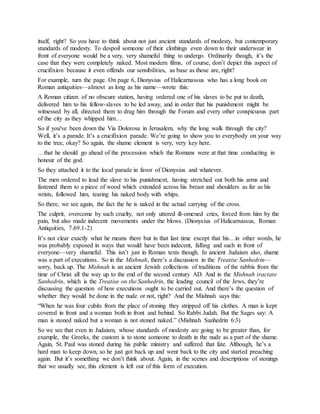
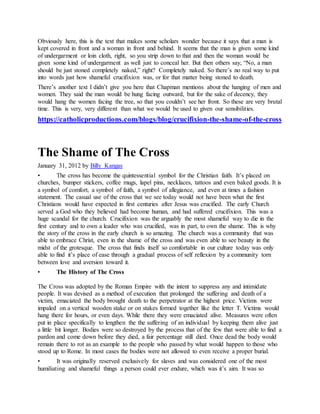
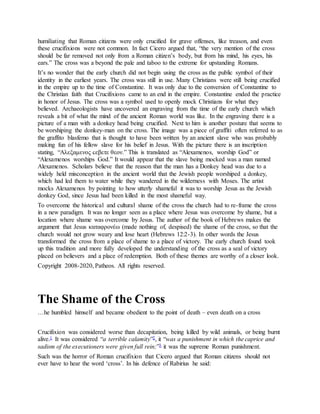
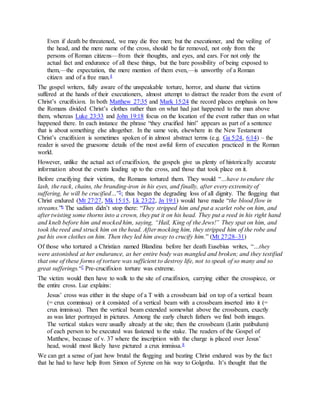
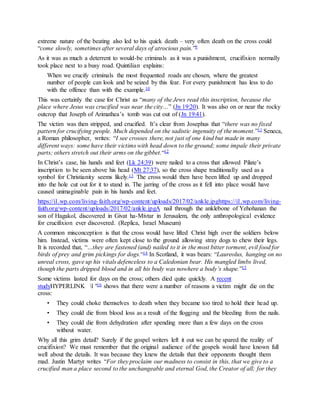
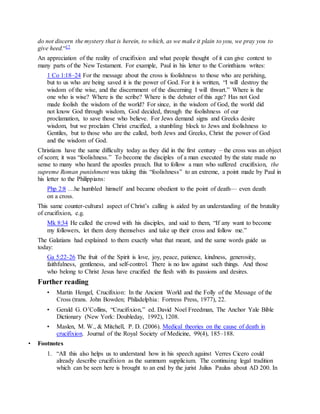
![the Sententiae compiled from his works towards AD 300, the crux is put at the head of
the three summa supplicia. It is followed, in descending order, by crematio (burning) and
decollatio (decapitation). In the lists of penalties given in the sources, damnatio ad bestias
often takes the place of decapitation as an aggravated penalty.” Martin Hengel,
Crucifixion: In the Ancient World and the Folly of the Message of the Cross (trans. John
Bowden; Philadelphia: Fortress Press, 1977), 33.l "
2. “Nay, he was not ashamed to look even that audience in the face and bring such a terrible
calamity upon an innocent man…” Dem., 21.105. Demosthenes, Demosthenes with an
English Translation by A. T. Murray, Ph.D., LL.D. (Speeches (English); Medford, MA:
Cambridge, MA, Harvard University Press; London, William Heinemann Ltd., 1939).l "
3. Martin Hengel, Crucifixion: In the Ancient World and the Folly of the Message of the
Cross (trans. John Bowden; Philadelphia: Fortress Press, 1977), 25.l "
4. Cicero, Rab. Perd. 5.16. M. Tullius Cicero, The Orations of Marcus Tullius Cicero,
Literally Translated by C. D. Yonge, B. A. (ed. C. D. Yonge; Medford, MA: Henry G.
Bohn, York Street, Covent Garden., 1856), 266.l "
5. Plat., Rep. 361e–362a. Plato, Plato in Twelve Volumes & 6 Translated by Paul Shorey
(vol. 5; Medford, MA: Cambridge, MA, Harvard University Press; London, William
Heinemann Ltd., 1969).l "
6. Op. cit., Hengel, 32.l "
7. Eus., Hist. eccl. 5.1.18. Eusebius of Caesaria, “The Church History of Eusebius,” in
Eusebius: Church History, Life of Constantine the Great, and Oration in Praise of
Constantine (ed. Philip Schaff and Henry Wace; trans. Arthur Cushman McGiffert; vol.
1; A Select Library of the Nicene and Post-Nicene Fathers of the Christian Church,
Second Series; New York: Christian Literature Company, 1890), 1214.l "
8. Ulrich Luz, Matthew 21–28: A Commentary (ed. Helmut Koester; Hermeneia—a Critical
and Historical Commentary on the Bible; Minneapolis, MN: Augsburg, 2005), 531.l "
9. Gerald G. O’Collins, “Crucifixion,” ed. David Noel Freedman, The Anchor Yale Bible
Dictionary (New York: Doubleday, 1992), 1209.l "
10. Quintilian, Decl. 274. Quintilian, The Lesser Declamations, Volume I (ed. D. R.
Shackleton Bailey, Loeb, 2006), 259.l "
11. Gerald G. O’Collins, “Crucifixion,” ed. David Noel Freedman, The Anchor Yale Bible
Dictionary (New York: Doubleday, 1992), 1209.l "
12. Seneca, Dial. 6 [Cons. Marc] 20.3.l "
13. Op. cit., Luz, 531.l "
14. Op. cit., Hengel, 9, translated from Apotelesmatica 4.198ff. (Koechly, p. 69)l "
15. Martial, Liber Spectaculorum 7. Martial: Liber Spectaculorum, (ed. Kathleen M.
Coleman, OUP Oxford, 2006)l "
16. Maslen, M. W., & Mitchell, P. D. (2006). Medical theories on the cause of death in
crucifixion. Journal of the Royal Society of Medicine, 99(4), 185–188.l "
17. Justin, 1 Apol. 13. Justin Martyr, “The First Apology of Justin,” in The Apostolic Fathers
with Justin Martyr and Irenaeus (ed. Alexander Roberts, James Donaldson, and A.](https://image.slidesharecdn.com/jesuswasashamefulsufferer-200222145625/85/Jesus-was-a-shameful-sufferer-31-320.jpg)
![Cleveland Coxe; vol. 1; The Ante-Nicene Fathers; Buffalo, NY: Christian Literature
Company, 1885), 1167.l "
Author: Nat Ritmeyer
Nat lives in London with his wife and son. His main interests are the Ancient Near Eastern
background to the bible, the Iron Age I period, and travelling through the Modern Near East. He
is also scared of geese. View all posts by Nat Ritmeyer
The "Shame of the Cross" and its Glory
Or: The Curse of the Cross and its Blessing
This article attempts to be a quite comprehensive overview and interpretation of all the Bible and
the Qur'an say on the topic of the Crucifixion of Jesus, the Messiah: Whether it happened, and
what its meaning might be.
I want to deal with the topic in three parts:
Part 1: The Message of the Prophets before Jesus
Part 2: The Teachings of Jesus himself and of his Apostles
Part 3: The statements in the Qur'an and final conclusions
And after the "theological discussion" is presented, I think the following will be an important
appendix:
Part 4: Consequences: Where do we go from here?
Although I feel like apologizing for the length of this treatise, I hope that its length will allow it
to be thorough and helpful in providing a deeper understanding of our respective views. If you
have any interest in understanding the Christian faith and the content of the Bible, I urge you to
stick with me, because at the end, you will see that this whole question and its supposed "Islamic
solution" will prove to be a major headache to Muslims [that is, if you dare think about it -
instead of just dismissing the problem] and it uncovers a big inconsistency in the Islamic faith.
Though being an Ahmadiyyan, Mr. ...'s argument below is also one of the usual Muslim
arguments against Jesus' dying on the cross.
But I think that the Muslim "solution" is more consistent than the Ahmadiyyan one. Muslims
say, because this is a shameful death, Allah would not allow this to happen to His prophet, and
the Qur'an indeed says, that Jesus did not go to the cross but was 'rescued' from it and some sort
of illusion was staged instead. [Qur'an 4:157]
In the contrary, the Ahmadiyyas say that Jesus DID go to the cross but did not die there. He
supposedly survived it, was resuscitated and then emigrated to India where he eventually died of
old age [in order to make room for Mr. Ahmad to come and claim to be the Messiah].](https://image.slidesharecdn.com/jesuswasashamefulsufferer-200222145625/85/Jesus-was-a-shameful-sufferer-32-320.jpg)
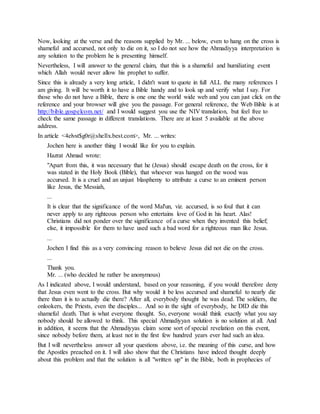
![earlier prophets, saying it would exactly happen this way and in the teaching of Jesus himself on
this very topic.
You referred correctly to the curse of God, as it is written in the Torah:
If a man guilty of a capital offense is put to death and his body is hung on a tree, you
must not leave his body on the tree overnight. Be sure to bury him than same day,
because anyone who is hung on a tree is under God's curse. You must not desecrate the
land the LORD your God is giving you as an inheritance. (Deuteronomy 21:22-23)
Actually, the usual procedure was to put the condemned person to death and after he died to put
him up on the tree as a demonstration of the punishment of evil and to deter others from
following his evil ways. But the fact that Jesus died on the cross instead of being hung on the
cross after dying is not much of a difference. He has been hung on the cross/tree and that is
understood as a sign of God's curse on him.
Christians did very much ponder about the meaning of the cross, the curse upon the one on the
cross and what it all means. It is not that the Ahmadiyya are the first to find this 'shameful'. It
was shameful to the very people who saw it. It is part of the horror of the death on the cross. And
it is one reason that many Jews did NOT accept Jesus as the Messiah. Even some of his
followers thought it was over, now that Jesus had died, and even died in a way that displayed the
curse of God on him. Luke reports of a conversation two of the disappointed disciples have then
someone asks them why they are so sad. Their answer is:
"[It is] about Jesus of Nazareth", they replied. "He was a prophet, powerful in word and
deed before God and all the people. The chief priest and our rulers handed him over to be
sentenced to death and they crucified him; but we had hoped that he was the one who was
going to redeem Israel [i.e. the Messiah]." (Luke 24:19-21)
They understood well, that this kind of death, the crucifixion, meant (in the usual understanding
of the Jews) that he couldn't be the Messiah. How could the Messiah be under God's curse?
Now, this stranger who is joining these two disciples and asked them for the reason of their
sadness is none other than the risen Lord, Jesus. And as he joins them on their way, he starts to
explain them the true meaning of the scriptures and that all this has happened exactly like God
had foretold it through his earlier prophets.
He (Jesus) said to them, "How foolish you are, and how slow of heart to believe ALL that
the prophets have spoken! Did not the Christ have to suffer these things and then enter his
glory?" And beginning with Moses and all the Prophets, he explained to them what was
said in all the Scriptures concerning himself.
(Luke 24:25-27)
Now, WHAT do the earlier prophets say? Sadly Luke was a bit short in this account and I am
sure many would like to know what Jesus taught them on this way. But we can only guess and
have to search the Old Testament for ourselves to see what indeed is written there. And note that
Jesus put suffering and glory together. Yes, ultimately he will enter his glory, but the way is
through suffering and this is not a contradiction in his mind.
I would like to do in this article the same for you as Jesus did for his disappointed disciples, who
thought that God would never let that happen to His Messiah. Well, they had SEEN Jesus hang
on cross and die, so claiming that it never happened was not an option for these very
disappointed and confused but honest people. So the only solution to the dilemma for these Jews](https://image.slidesharecdn.com/jesuswasashamefulsufferer-200222145625/85/Jesus-was-a-shameful-sufferer-34-320.jpg)
![was, that Jesus could not have been the Messiah after all. And that is their verdict on it to this
day. But what has Jesus shown these two? I don't know the exact verses they were talking about.
But I want to show you a few (out of many) which Jesus might have used to show them the
meaning of it all.
The King and Prophet David wrote this Psalm which is prophecying about the crucifixion of the
Messiah (1000 years before the birth of Jesus!), and this is the very prayer/passage Jesus
prayed/quoted while on the cross as we can see from the first verse. In brackets, e.g. [John 3:35],
I will give (one or more of) the parallel passage of the New Testament relating to the Old
Testament prophecy in the specific verse that precedes it. Please do check them out.
Psalm 22.
For the director of music. To [the tune of] "The Doe of the Morning."
A psalm of David.
1 My God, my God, why have you forsaken me? Why are you so far from saving me, so
far from the words of my groaning? [Matthew 27:46]
...
6 But I am a worm and not a man, scorned by men and despised by the people.
7 All who see me mock me; they hurl insults, shaking their heads:
8 "He trusts in the LORD; let the LORD rescue him. Let him deliver him, since he
delights in him." [Matthew 27:41-49]
Yes, even David prophesied that the Messiah would be despised and die a shameful death with
mockers around him.
...
14 I am poured out like water, and all my bones are out of joint. My heart has turned to
wax; it has melted away within me.
15 My strength is dried up like a potsherd, and my tongue sticks to the roof of my mouth;
you lay me in the dust of death.
[In John 19:28 Jesus expresses his thirst - and in general, this description is very accurate of what
a crucified person would feel. And note the last word, it is about dying: death.]
16 Dogs have surrounded me; a band of evil men has encircled me,
they have pierced my hands and my feet.
[This expression of "piercing" will come back later! And, as we know, Jesus was nailed to the
cross through his hand(wrist)s and feet - and this is one of the signs of recognition by his
disciples, see Luke 24:40, John 20:20,25]
17 I can count all my bones; people stare and gloat over me.
18 They divide my garments among them and cast lots for my clothing. [Mark 15:24]
...
24 For he has not despised or disdained the suffering of the afflicted one; he has not
hidden his face from him but has listened to his cry for help.
[Although this person is so afflicted and despised, God is not rejecting him, contrary to what
everyone would expect.]
25 From you comes the theme of my praise in the great assembly; before those who fear
you will I fulfill my vows.](https://image.slidesharecdn.com/jesuswasashamefulsufferer-200222145625/85/Jesus-was-a-shameful-sufferer-35-320.jpg)
![26 The poor will eat and be satisfied; they who seek the LORD will praise him -- may
your hearts live forever!
27 All the ends of the earth will remember and turn to the LORD, and all the families of
the nations will bow down before him,
[What happens here at the cross, this despised death, will result in the spread of God's message
all around the earth, people from all nations will turn to the Lord and will worship Him.]
28 for dominion belongs to the LORD and he rules over the nations.
29 All the rich of the earth will feast and worship;
all who go down to the dust will kneel before him -- those who cannot keep themselves
alive.
30 Posterity will serve him; future generations will be told about the Lord.
31 They will proclaim his righteousness to a people yet unborn -- for he has done it.
And this message of the Lord's righteousness will spread throughout the earth and throughout the
generations [Luke 24:46-47]. And though it doesn't look like it at the time, David concludes his
prophecy with "He has done it". And "he" is the Lord himself. This whole event is God's plan,
this was not an accident. God foretold it 1000 years before it happened in history.
Whom is David talking about? Was he describing a nightmare he had after overeating at the
evening meal? That would not have been included in God's word then. And a nightmare wouldn't
contain these precious words of worship to God, of His righteousness proclaimed to all people.
No, as Jesus has said, God's Word is is full of prophecies about the Messiah and who else could
be so important as to give such a detailed description of his death? And none but Jesus fits this
prophecy. And as verse 27 says, this event leads to the fact that all the ends of the earth will turn
to the Lord, and people from all different nations will bow before the Lord.
Let me give you another astonishing Old Testament passage, this time the Lord speaks through
the prophet Zechariah, about 500 years before Christ. In chapters 12 and 13 we read:
Zechariah 12:
1 This is the word of the LORD concerning Israel.
The LORD, who..., declares:
2 "I am going to ...
...
10 "And I will pour out on the house of David and the inhabitants of Jerusalem a spirit of
grace and supplication. They will look on me, the one they have pierced,
and they will mourn for him as one mourns for an only child, and grieve bitterly for him
as one grieves for a firstborn son.
On the cross Jesus was pierced through his hands, feet (by nails), and his side (by a spear), John
19:34, John 20:20,25.
And this passage will be considered again in my exposition on the Trinity but here we are only
concerned with the prediction of crucifixion.
God speaks in this whole chapter in the first person, and says that Israel will PIERCE Him and
then LOOK at Him. These are very tangible words of the physical world. And what is happening
at this day when they pierce him (God!)? The mourning will be like for a son!](https://image.slidesharecdn.com/jesuswasashamefulsufferer-200222145625/85/Jesus-was-a-shameful-sufferer-36-320.jpg)
![And the next verse continues in Zechariah 13:
1 "On that day a fountain will be opened to the house of David and the inhabitants of
Jerusalem, to cleanse them from sin and impurity.
Another such passage explaining in clearest terms the meaning of the death of the suffering
servant of God, is Isaiah 52-53 (Isaiah was a prophet around 740 B.C.):
Isaiah 52:
13 See, my servant will act wisely; he will be raised and lifted up and highly exalted.
14 Just as there were many who were appalled at him -- his appearance was so disfigured
beyond that of any man and his form marred beyond human likeness --
[Resulting from the torture before the crucifixion, scourging etc]
15 so will he sprinkle many nations,
[The sprinkling of blood is a sign of cleansing and forgiveness of sins, Hebrews 9:11-
15,Leviticus 16:15-19.]
and kings will shut their mouth because of him. For what they were not told, they will
see, and what they have not heard, they will understand.
Chapter 53:
1 Who has believed our message and to whom has the arm of the LORD been revealed?
2 He grew up before him like a tender shoot, and like a root out of dry ground. He had no
beauty or majesty to attract us to him, nothing in his appearance that we should desire
him.
3 He was despised and rejected by men, a man of sorrows, and familiar with suffering.
Like one from whom men hide their faces he was despised, and we esteemed him not.
[This is said about the servant of the Lord - seemingly shame and humiliation does not disqualify
a person from being God's servant. But "who will believe?" (verse 1), that is the first question at
the beginning of the chapter and this is the question still asked today. And following this
question, God again explains the meaning of this death]
4 Surely he took up our infirmities and carried our sorrows, yet we considered him
stricken by God, smitten by him, and afflicted.
[As it SEEMED, he was under God's punishment and curse but the contrary is true]
5 But he was pierced for our transgressions, he was crushed for our iniquities; the
punishment that brought us peace was upon him, and by his wounds we are healed.
6 We all, like sheep, have gone astray, each of us has turned to his own way; and the
LORD has laid on him the iniquity of us all.
7 He was oppressed and afflicted, yet he did not open his mouth; he was led like a lamb
to the slaughter, and as a sheep before her shearers is silent, so he did not open his mouth.
8 By oppression and judgment he was taken away. And who can speak of his
descendants? For he was cut off from the land of the living; for the transgression of my
people he was stricken.
9 He was assigned a grave with the wicked, and with the rich in his death, though he had
done no violence, nor was any deceit in his mouth.
10 Yet it was the LORD's will to crush him and cause him to suffer, and though the
LORD makes his life a guilt offering, he will see his offspring and prolong his days, and](https://image.slidesharecdn.com/jesuswasashamefulsufferer-200222145625/85/Jesus-was-a-shameful-sufferer-37-320.jpg)
![the will of the LORD will prosper in his hand.
11 After the suffering of his soul, he will see the light [of life] and be satisfied; by his
knowledge my righteous servant will justify many, and he will bear their iniquities.
12 Therefore I will give him a portion among the great, and he will divide the spoils with
the strong, because he poured out his life unto death, and was numbered with the
transgressors. For he bore the sin of many, and made intercession for the transgressors.
Time and again in this short passage, God says that this righteous servant of His will bear the sin
of his people, the sin of the transgressors. And though he will be unjustly condemned to death
(verse 8) it ultimately was the Lord's doing and will (verse 10) because from eternity past it was
planned that he will give his life as a guilt offering and forgiveness will be available for all who
have sinned. Jesus, the righteous servant who had no sin of his own, bore the iniquities of the
many (verse 11), and he did not curse but prayed for his enemies who put him on the cross (verse
12, Luke 23:34).
And there are many many more parallels to the life and suffering of Jesus in those few verses.
God made this plan known 740 years before Jesus was even born. This was no accidental death.
And the curse of the cross is the curse that God put on all sin and which he judged in this historic
event on the cross.
But the Jews originally didn't understand it and even the Apostles and other disciples could not
completely comprehend it at first, even though Jesus had spoken about it many times. But they
later realized very clearly its meaning, when Jesus explained it to them after the resurrection. He
had talked about it before too, but it seems that the disciples couldn't grasp it before it had
happened.
So far we have seen what the earlier prophets David, Zechariah and Isaiah say about the death
(crucifixion) of the Messiah.
In the next part, we will see what Jesus himself and his Apostles teach about it and also look at
the passages of the Qur'an in regard to the crucifixion.
The Cross of Christ
Answering Islam Home Page
The Shame Of The Cross
Tom M. Roberts
Ft. Worth, Texas
The gospel accounts tell us that Jesus faced the prospect of crucifixion with much
dread and agony of spirit. Matthew states that Jesus was "sorrowful and sore
troubled," "exceeding sorrowful," and prayed that, "if it be possible, let this cup
pass away" (Mt. 26:37ff). Luke adds that He was "in an agony," that He prayed at
length and that His "sweat became as it were great drops of blood falling down
upon the ground." Without question, this is language that dramatizes the inner
feelings of Jesus as He anticipated the hours that faced Him. Yet, with all due](https://image.slidesharecdn.com/jesuswasashamefulsufferer-200222145625/85/Jesus-was-a-shameful-sufferer-38-320.jpg)
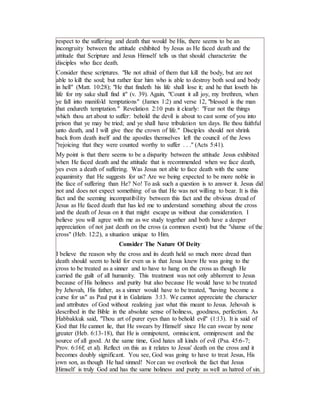
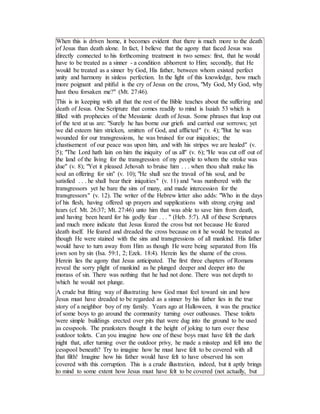
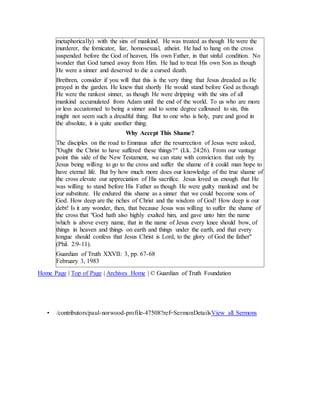
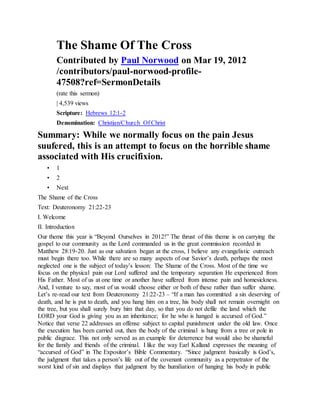
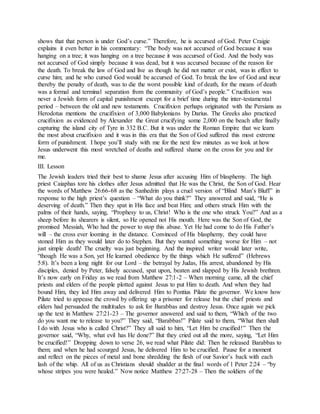
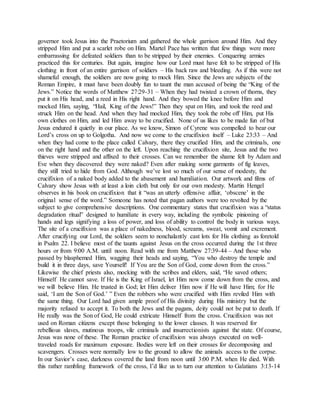
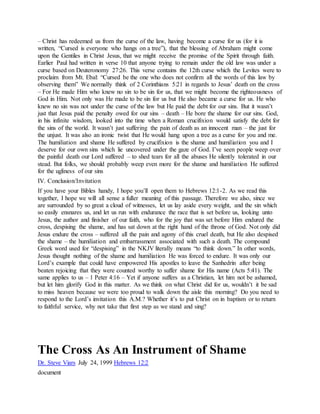
![https://s3.amazonaws.com/faith-web-
assets/general/resources/document/cross03.doc?mtime=20170518201717
- This morning we’re going to be continuing on in our study entitled “Embracing the Cross.”
- This summer we’ve been looking at what the Word of God teaches us about the cross-work of
Jesus Christ.
- so far we’ve seen that the Bible explains that the cross is....
1) An instrument of peace - Col. 1:20 - “having made peace through the blood of His cross.”
- We’ve also seen that the cross is....
2) An instrument of power - 1 Corinthians 1:18 - “For the word of the cross is to those who are
perishing foolishness, but to us who are being saved it is the power of God.”
- so its an instrument of peace, and its an instrument of power....today we’d like to study the
Scripture’s emphasis of the cross as an instrument of shame.
- to try to help us benefit the most from what we’re about to study, let me ask you a series of
questions.
1) Are you a person who wants to please God?
- are you a person who wants to grow?
- if we were to sit down together, and talk about things that are especially important to you,
things that you’re striving for, and wanting to achieve.....
- would the concept of pleasing Him, of glorifying Him, of becoming more like Christ, of
making changes.....be at the top of the list?
- would you say that you’re not just wanting to coast along....you’re not just wanting to be
stagnant in your relationship with Christ.....but that you really want to get to a better place?
- so you’ve made it your goal to please Him and take the steps necessary to do that?
- I’m assuming that’s the case for every person in the auditorium.
- whether it really is for you or not is between you and God, but I’m operating on the assumption
that that’s true.
2) Would you agree that there are certain blessings and benefits or rewards associated with that
goal?
- you could picture this like a race....where you are running toward a prize.....
- the joy of knowing you did what God wanted you to do.....
- the blessing of a clear conscience.....
- the privilege of hearing the words “well done, thou good and faithful servant”.
- the benefit that comes from avoiding the consequences of sin....
- the positive impact on your family and friends, and acquaintances.
- would you agree, in the quietness of this moment, that at least on paper.....the idea of pressing
on to maturity.....of making progress of spiritually.....is very attractive.....
- it makes a lot of sense?
- the answer to that should be “yes”....so far, so good.
- now, can I ask you a harder question.....as you evaluate the last six months, or the last
year....are you satisfied with the rate of progress?
- its one thing to say I want to become more pleasing to God, or I want to grow, or I want to take
steps....[and even to realize that there would be great benefits to doing so].....
- its something else to actually take the steps....](https://image.slidesharecdn.com/jesuswasashamefulsufferer-200222145625/85/Jesus-was-a-shameful-sufferer-46-320.jpg)
![- to make the decisions, to exert the effort....
- so I’m asking you......are you satisfied with your rate of progress?
- now I realize that there’s a broad range of possible answers to that one....but I’m going to
assume that you fit somewhere between the range of “not entirely” and “just plain no”.
- now let’s push it one step further......
3) What’s standing between you, and accomplishing the goal?
- what’s standing between you, and taking the steps of growth / progress that God desires, and
you say that you desire?
- that question, I can answer.
- even if I’ve never had the privilege of meeting you....and even if you were getting ready to
say.....its my spouse, its my job, its my health, its my clothes, its my parents, its this town....
- biblically, we can say that in a very real sense...what stands between you and your
accomplishing the goal of taking steps toward growing and pleasing God.....is a cross.
- you say , how do you know that?
- because Jesus Christ said --- if you want to be one of my disciples, you have to deny yourself,
take up your cross, and follow me.
- the path to pleasing God always involves the cross.
1) For example, if you have not yet trusted Jesus Christ as Lord and savior, you can’t accomplish
the goal of pleasing Him without first “embracing the cross”.
- of admitting your sin.....of admitting your inability to save yourself....
- and of placing your faith and trust in the death, burial, and resurrection of Christ.
- you can’t get there [to the goal] without embracing the cross/
2) For the many here who have trusted Christ.....you can’t take the next step of growth without
embracing the cross.
- there is no such thing as growth without the cross....
- there is no such thing as progress without sacrifice....
- if you want to be one of my disciples, you have to deny yourself, take up your cross, and follow
me.
- and what that cross looks like for you is as varied as the number of people here this morning.
- but I want to ask you to think hard about.......what is the next step of growth for you.....
- and what is the nature of the cross required to take that step?
- for a spouse, it might be crucifying your own desires in the marriage and being God’s kind of
spouse first.
- for a young person, it might be the cross of honoring and obeying your parents even though
that’s hard.
- for a friend, it might be being more vocal about what Jesus Christ means to you.
- it may be a matter of putting off a sinful habit....you know you’re not going to make progress
spiritually until you deal with this.....
- for others, it may involve putting on a right habit or discipline.....you know you’re not going to
make progress until you start doing right in this particular area.....
- advancement in the Christian life without the cross is impossible.....there is no such thing.
- well, then what’s the obvious question?
- then why aren’t we quicker to embrace the cross?
- why aren’t we quicker to do whatever we have to do to accomplish the goal?](https://image.slidesharecdn.com/jesuswasashamefulsufferer-200222145625/85/Jesus-was-a-shameful-sufferer-47-320.jpg)
![- if getting there [the goal] requires embracing this [the cross], then why aren’t we quicker about
it?
- the Bible answers that question too.......just like there’s very positive associated with the
goal....joy, blessing, and fulfillment, and peace.
- there’s something very negative associated with the cross.....
- do you know what it is.....shame.
- we’re going to see a verse in just a minute that teaches how the cross is an instrument of shame.
- when you embrace the cross, you open yourself up to ridicule from others....
- when you embrace the cross, you are saying things about yourself that are not easy to say.....
- when you embrace the cross, you are becoming vulnerable.....
- when you embrace the cross, you are opening yourself up to pain.
- just like there is no such thing as growth without a cross.....
- there is also no such thing as a cross without shame.
- and friend, the issue is ---- what are you going to do with the shame that comes with the cross?
- with that in mind, let me invite you to open your Bible this morning to Hebrews chapter 12,
verse 2.
- I hope that as we go through this series, that phrases from our key verses will stay with you,
and be a help to you as you grow.....
- from Col. 1:20 - “having made peace through the blood of His cross.”
- from I Cor. 1:18 - “...to us who are being saved it is the power of God.”
- Hebrews 12:2 is another one of key verses, and you could describe all of these as “hard candy”
verses.....
- you have to hold them for a while....you have to turn them over and over......careful
concentration and meditation is important....
- but the benefits are sweet.
- read Hebrews 12:2.
- in the time we have remaining, I’d like us to think about I. The Shame of the Cross, II. How
Jesus Dealt with the Shame of the Cross, III. Lessons for Us Today.
I. The Shame of the Cross.
- Hebrews chapter 12 helps us to understand that the cross is an instrument of shame.
- according to the NT Dictionary of Theology, the word “shame” that is used in this verse
literally means “to disfigure, make ugly.....shame exposes one to the ridicule of society.”
- those words may bring to mind those sobering verses in Isaiah 53, where we’re told..... He has
no stately form or majesty That we should look upon Him, Nor appearance that we should be
attracted to Him. He was despised and forsaken of men, A man of sorrows, and acquainted with
grief; And like one from whom men hide their face, He was despised, and we did not esteem
Him. Surely our griefs He Himself bore, And our sorrows He carried; Yet we ourselves esteemed
Him stricken, Smitten of God, and afflicted.
- these verses aren’t telling us that Jesus was somehow physically unattractive---they’re telling
us about the position in which Jesus placed Himself when He was dying on the cross for us.
- the cross is an instrument of shame.
- one of the reasons we need to hear this is because the cross, at least on one level, doesn’t have](https://image.slidesharecdn.com/jesuswasashamefulsufferer-200222145625/85/Jesus-was-a-shameful-sufferer-48-320.jpg)
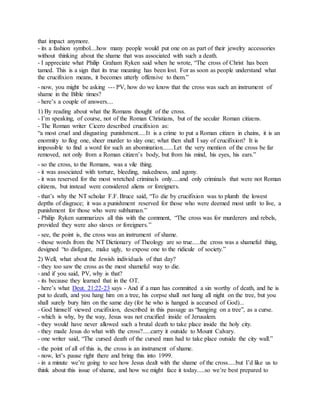
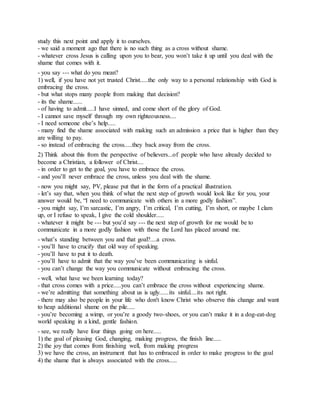
![- you can’t get to the goal without embracing the cross.....
- and you can’t embrace the cross without experiencing shame.....
- that leaves us with a huge question.....how much value are you going to place on the shame?
- are you going to let that shame stop you from embracing the cross, and therefore stop you from
growing at the rate that God wants you to?
- now, you might say --- I’m not sure ---- is there an example I can follow?
- that takes us to our second important point......we need to go from I. The Shame of the Cross,
to....
II. How Jesus Dealt with the Shame.
- please look closely again at the phrase in the middle of Hebrews 12:2.....[we’ll pick it up at the
end of verse 1].
- “...let us run with endurance the race that is set before us, fixing our eyes on Jesus, the author
and perfecter of faith, who for the joy set before Him endured the cross, despising the shame, and
has sat down at the right hand of the throne of God.
- now, please let that sink in for a moment......this is one of those “hard candy” kind of phrases.
- we saw clearly that in Bible times, the cross was an instrument of shame.
- this passage clearly outlines the categories we’ve been talking about this morning.....
- what did Jesus do.....for the joy set before Him, endured the cross, despising the shame.
- now, if you’re following all this this morning, the question has to be.....but what does it mean to
“despise the shame” and how do I do that in everyday life?
- let’s zero in on that word “despise” because that’s the key to all of this.
- what does the word “despise” mean?
- you might say, “hate”......and that’s true....but what does it mean to “hate the shame” associated
with the cross?
- please look over at Romans 2:4 and this should make a whole lot more sense.
- this is another use of our word “despise”......but its used very much like our key verse in
Hebrews 12:2.
- now, I’m going to read this first from the New American Standard Version.....please think
about which word translated “despise” in Hebrews 12:2 is also used here in Romans 2:4.
- Romans 2:4 - Or do you think lightly of the riches of His kindness and forbearance and
patience, not knowing that the kindness of God leads you to repentance?
- now, which words in Romans 2:4 do you think come from the same original Greek word as
“despise” in Hebrews 12:2?
- the words “think lightly”......
- in fact, if you have a KJV, its translated as “despise”?
- now you say, PV, you’re almost losing me......
- let me reel you back in if that’s the case.
- when the writer of Hebrews said, Jesus endured the cross by despising the shame....he was
saying.....”Jesus thought lightly of the shame”.....He didn’t assign a heavy weight of value to
it.....](https://image.slidesharecdn.com/jesuswasashamefulsufferer-200222145625/85/Jesus-was-a-shameful-sufferer-51-320.jpg)
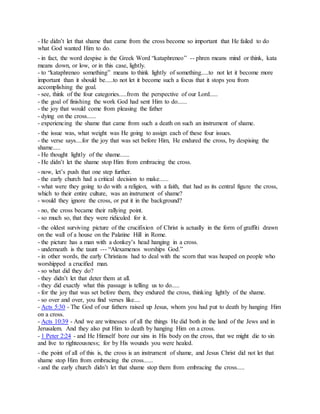
![- and the question for you and me is.....what are you going to do with the shame that comes with
the cross?
- are you going to “think lightly of it”, or are you going to let it stop you from doing what God
wants you to do?
- let’s conclude all of this by talking about:
III. Lessons for Us Today
- I’d like to speak first of all to those who haven’t yet trusted Jesus Christ as Savior and Lord.
- Friend, does this verse help explain why taking that step might be difficult in your case?
- the cross is an instrument of shame.....God doesn’t hide that fact from anyone.
- to become a Christian, you do have to admit some hard things about yourself.
- you do have to open yourself up to possible criticism or ridicule from others.
- is it possible that instead of thinking lightly about that, you’ve assigned a great weight of
importance to this......and in essence said, if I have to humble myself to come to Christ, then I
won’t come to Christ.....
- if I have to risk my reputation to come to Christ, then I won’t come to Christ.
- friend, God resists the proud, but He gives grace to the humble.
- would you be willing to embrace the cross today, by admitting your sin and coming to Christ
by faith?
- believing friend, what about these questions we’ve been repeating all morning?
- what is the next step in your growth?
- and is it true that in order to get there, you have to go through the cross?
- and is it possible that you’ve held back and held back and held back.....because you don’t want
to endure the cross.....
- you don't want to risk the shame....
[develop --- maybe give a practical application to finish it off]
Dr. Steve Viars
The Triumphant Shame of the Cross
• Devotional by John Piper
[Christ did not] offer himself repeatedly, as the high priest enters the holy places every
year with blood not his own, for then he would have had to suffer repeatedly since the
foundation of the world. But as it is, he has appeared once for all at the end of the ages to
put away sin by the sacrifice of himself. (Hebrews 9:25–26)](https://image.slidesharecdn.com/jesuswasashamefulsufferer-200222145625/85/Jesus-was-a-shameful-sufferer-53-320.jpg)
![It is not to be taken for granted that there should be a welcome for sinners in heaven.
God is holy and pure and perfectly just and righteous. Yet the whole story of the Bible is how
such a great and holy God can and does welcome dirty, unholy people like you and me into his
favor. How can this be?
Hebrews 9:25 says that Christ’s sacrifice for sin was not like the sacrifices of the Jewish high
priests. They came into the holy place yearly with animal sacrifices to atone for the sins of the
people. But these verses say Christ did not enter heaven to “offer himself repeatedly . . . for then
he would have had to suffer repeatedly since the foundation of the world” (Hebrews 9:26).
If Christ followed the pattern of the priests, then he would have to die yearly. And since the sins
to be covered include the sins of Adam and Eve, he would have had to begin his yearly dying at
the foundation of the world. But the writer treats this as unthinkable.
Why is this unthinkable? Because it would make the death of the Son of God look weak and
ineffective. If it has to be repeated year after year for centuries, where would be the triumph?
Where would we see the infinite value of the sacrifice of the Son of God? It would vanish in the
shamefulness of a yearly suffering and death.
There was shame in the cross, but it was triumphant shame. “[Jesus despised] the shame, and is
seated at the right hand of the throne of God” (Hebrews 12:2).
This is the gospel of the glory of Christ, the image of God (2 Corinthians 4:4). I pray that no
matter how dirty or unholy with sin you are, you will see the light of this glory and believe.
Despising the Shame of the Cross
https://www.blogger.com/post-
edit.g?blogID=2907816974556980237&postI
D=3467175445721900542&from=pencil
Kevin Booker
Brothers and sisters, have you ever been in a situation where you were tempted to be ashamed of
the cross of Jesus?
In Luke 9:23 Jesus said that if anyone would come after him they must take up their cross daily
and follow him. When we carry our cross there is always the possibility of being persecuted in
some way. We may be stigmatized or ridiculed or shunned or treated badly by others. Personally
there are times when I have been tempted to ‘put down my cross’ because of shame it might
bring on me. Whether it is because I don’t laugh at a coarse joke or I walk away from an
immoral conversation; or praying in public at a restaurant, or preaching the gospel to the person
sitting next to me on the train or bus, or for even refusing to engage in gossip. Whenever we are
faced with the temptation of being embarrassed or ashamed Heb 12:2 teaches us how to
overcome these thoughts:](https://image.slidesharecdn.com/jesuswasashamefulsufferer-200222145625/85/Jesus-was-a-shameful-sufferer-54-320.jpg)
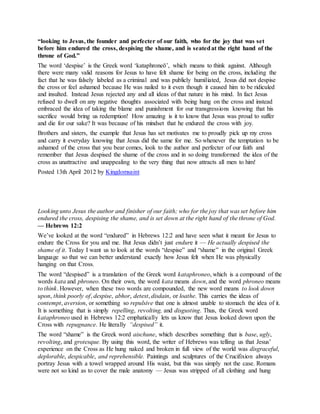
![naked before the jeering crowd. For a Jew who respected the human body as something made in
the holy image of God and who abhorred the naked idols of paganism, this indignity was utterly
repugnant and embarrassing.
Imagine if you were beaten to a pulp and then hung physically naked in front of your friends,
family, coworkers, and acquaintances. How would you feel? According to the Greek word
aischune used in Hebrews 12:2, the Lord Jesus felt a deep sense of “shame” and
“embarrassment” in that horrific moment.
*[If you started reading this from your email, begin reading here.]
Jesus paid the price for sin, for sickness and disease, for mental suffering, and for shame.
Just as Jesus endured the scourging to procure our physical healing (see Isaiah 53:5), He literally
took our shame upon Himself to pay the price for any humiliation that would ever try to poison
our lives. As my wife Denise writes in her book, Redeemed From Shame:
Oh, how God wants us to experience His great love for us every moment of our lives! Because of
His suffering on the Cross, He paid the ultimate price for us to experience His loving presence.
This is possible not by any work of righteousness that we have done, but by trusting in what He
has done.
So don’t listen to the lies of the devil about your past. Don’t let him convince you to give up.
Instead, seek God’s face, and listen to the loving words of truth from God’s Spirit that are there
for you. Jesus’ flesh was not ripped apart in vain. It was for your deliverance and freedom to
become the person God planned for you to be!
Jesus took all your shame and fear so you wouldn’t have to be tormented by its wicked hold. In
exchange, He freely offered you His glory and healing power. All you have to do is receive by
faith what He has already given you. You are free from the bondage of shame in Him. Now it’s
time to live free in Jesus’ Name!4
4Denise Renner, Redeemed From Shame (Tulsa, OK: Harrison House, 2004), p.
Have you ever felt publicly humiliated? Have you ever been ashamed because of something
you’ve been through or because of something someone said? Have you felt the discomfort, pain,
and even torture of embarrassment and humiliation?
If you’ve experienced these feelings, take comfort in the fact that Jesus felt them too. He took
those emotions upon Himself as part of His sacrificial work on the Cross so that you and I could
be set free. We don’t have to be encumbered with feelings of shame for the rest of our lives. He
literally took our shame so we could be free from it!
Regardless of what has happened in your past that might have made you feel embarrassed or
ridiculed, know that Jesus took your shame upon Himself and set you free. Your freedom from
shame and humiliation was included in His work on the Cross, and you never have to be
tormented with those hellish thoughts again — because of Jesus!
M o s c o w G o o d N e w s C h u r c h](https://image.slidesharecdn.com/jesuswasashamefulsufferer-200222145625/85/Jesus-was-a-shameful-sufferer-56-320.jpg)
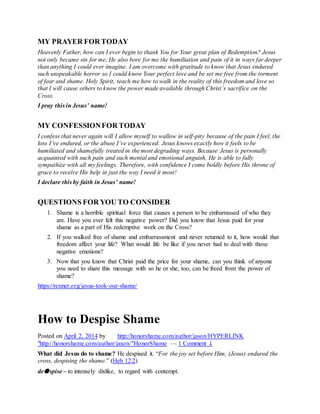
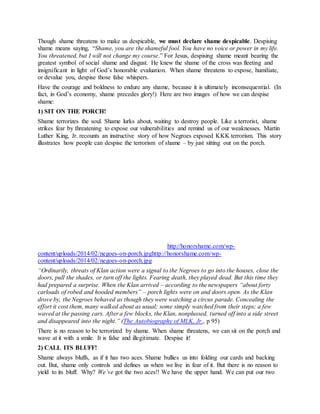
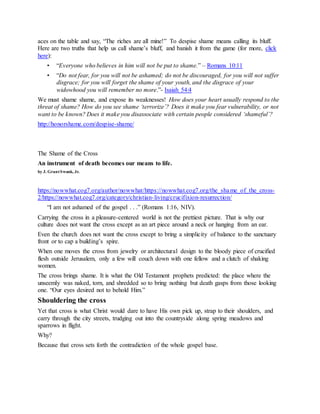
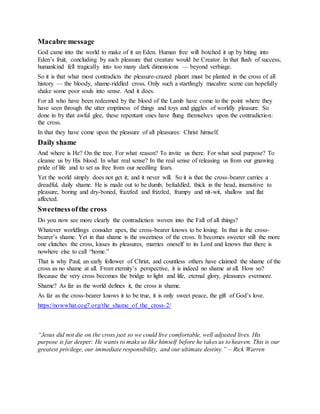
![The "Shame of the Cross" and its Glory
Part 4: Consequences: Where do we go from here?
We have seen that we do sharply disagree whether Jesus was crucified or not. And this issue will
have to be discussed further if there should be any meaningful Christian - Muslim dialog at all.
And this is not just about opinion "how Jesus died", it is ultimately about our understanding of
the character of God, the seriousness of sin, and other extremely fundamental issues, which I
didn't explicitly bring out here.
But there is one more aspect of the Cross which is worth pointing out as we think about the
question: How now do we handle our differences?
Nobody who really cares for truth, can go on his way and say, well, it doesn't really matter, let us
not take this too seriously. We are probably all "right in some way". If we really seek truth, this
relativistic "feel good" approach is unworthy to even be considered.
There is one horrible historical event that has poisoned so much of the relationship between
Muslims and Christians. I am talking about the Crusades. Some evil politicians (even Church
polititians) back then and in some instances still today, have used the name of God to justify their
greed and plans to enlarge the domain of their power.
The teaching of Jesus on this matter is very clear (Matthew 5):
1 Now when he [Jesus] saw the crowds, he went up on a mountainside and sat down. His
disciples came to him,
2 and he began to teach them, saying:
3 "Blessed are the poor in spirit, for theirs is the kingdom of heaven.
4 Blessed are those who mourn, for they will be comforted.
5 Blessed are the meek, for they will inherit the earth.
6 Blessed are those who hunger and thirst for righteousness, for they will be filled.
7 Blessed are the merciful, for they will be shown mercy.
8 Blessed are the pure in heart, for they will see God.
9 Blessed are the peacemakers, for they will be called sons of God.
10 Blessed are those who are persecuted because of righteousness, for theirs is the
kingdom of heaven.
11 Blessed are you when people insult you, persecute you and falsely say all kinds of evil
against you because of me.
12 Rejoice and be glad, because great is your reward in heaven, for in the same way they
persecuted the prophets who were before you.
13 You are the salt of the earth. But if the salt loses its saltiness, how can it be made salty
again? It is no longer good for anything, except to be thrown out and trampled by men.
14 You are the light of the world. A city on a hill cannot be hidden.
15 Neither do people light a lamp and put it under a bowl. Instead they put it on its stand,
and it gives light to everyone in the house.
16 In the same way, let your light shine before men, that they may see your good deeds
and praise your Father in heaven.](https://image.slidesharecdn.com/jesuswasashamefulsufferer-200222145625/85/Jesus-was-a-shameful-sufferer-61-320.jpg)
![And though we have to disagree sharply in regard to the content of the truth, let me quote again
part of a passage that I already drew your attention to in part 2. In 1 Corinthians 5 the Apostle
Paul writes:
18 All this is from God, who reconciled us to himself through Christ and gave us the
ministry of reconciliation:
19 that God was reconciling the world to himself in Christ, not counting men's sins
against them. And he has committed to us the message of reconciliation.
20 We are therefore Christ's ambassadors, as though God were making his appeal
through us. We implore you on Christ's behalf: Be reconciled to God.
The Cross means:
The voluntary suffering and death of Jesus on our behalf
The Crusades were:
The enforced suffering inflicted on others by a terrorist gang of "out of control soldiers" who
operated under the abuse of the name of Jesus.
I hope you see that the Crusades are the complete perversion of the command by Jesus to spread
the GOOD news. Sometimes "Christians" have been very bad news indeed. The Crusades are the
complete anti-thesis of the Gospel message.
The Gospel = evangel (Injil) = good news or reconciliation which seeks the free and loving
response of men and women to the acts of love done by God for us.
True Christians are followers of the crucified Lord, not followers of those who crucified him.
There is not only the Cross of our Lord in which we believe, but also a cross for each one who
follows him (Matthew 16):
21 From that time on Jesus began to explain to his disciples that he must go to Jerusalem
and suffer many things at the hands of the elders, chief priests and teachers of the law,
and that he must be killed and on the third day be raised to life.
22 Peter took him aside and began to rebuke him. "Never, Lord!" he said. "This shall
never happen to you!"
[It seems, Peter also had quite a problem with this concept.]
23 Jesus turned and said to Peter, "Get behind me, Satan! You are a stumbling block to
me; you do not have in mind the things of God, but the things of men."
24 Then Jesus said to his disciples,
"If anyone would come after me,
he must deny himself
and take up his cross and follow me.
25 For whoever wants to save his life will lose it, but whoever loses his life for me will
find it.
26 What good will it be for a man if he gains the whole world, yet forfeits his soul? Or
what can a man give in exchange for his soul?
The cross in the life of any believer is to be applied to ourselves, not to others. We have no
justification for bringing others suffering in order to further our wishes and goals, but we are to
die to our selfish ambitions and give up [=crucify] everything that hinders us in following Christ.](https://image.slidesharecdn.com/jesuswasashamefulsufferer-200222145625/85/Jesus-was-a-shameful-sufferer-62-320.jpg)
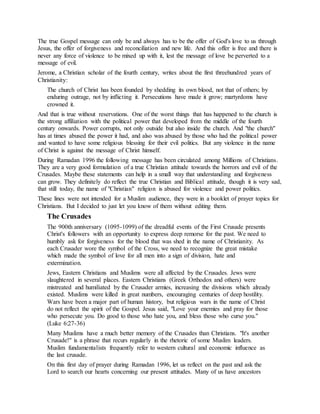
![who were involved in the Crusades. Many more of us are the spiritual descendants of
those who participated in and supported the Crusades.
While the past cannot be rewritten, each one of us can take a step toward laying a new
foundation for future generations. As Christians we can say that we are sorry for the past.
Let us pray for a healing of wounds between Jews, Christians and Muslims. Through His
death on the cross, Jesus made the way for us to have forgiveness of sins, to be reconciled
to the Father and to one another (2 Cor. 5:17-20). "Blessed are the peacemakers, for they
shall be called the sons of God." (Mt: 5:9).
I fully endorse these lines. I myself am very sorry for the suffering and evil that "the Church" has
brought on many Muslims. "We" will have to give account to God for distorting His Gospel in
your eyes beyond recognition. I understand that these memories live on and are even reinforced
by current situations like Bosnia. I want to assure you that this has all nothing to do with the
message Jesus has commanded us to preach and with the character we are supposed to display.
And though I personally had nothing to do with the Crusades of old, I also have to bow ashamed
before God's holy commands, and I am sorry for those times where I myself in the heat of the
argument have offended anyone. It never was my intention. We are admonished in God's Word
and it is my desire to speak the truth in love.
And this obviously means "as much as I think I understand of the truth". Nobody has absolute
understanding of all truth. And I am learning and growing, often accompanied by errors and
sometimes painful ones. I am a fellow pilgrim in the quest for truth and deeper understanding,
but I want to share with those who are on the same way that which I have already found and
which has enriched my life. And the wonderful gift of forgiveness through the death of Jesus, my
Savior, is part of what I cannot keep just to myself.
When I ask hard questions, then it is not in order to try to make Muslims look ridiculous, but it is
in the hope that you will start to think about those issues which in my conviction are of utmost
importance. We cannot afford any blind faith, but have to know what we believe and why we
believe it, and as best we can, make sure what we believe is really the truth. Our eternal destiny
depends on it.
If I only win an argument
[and I am obviously convinced that the case for the Christian faith is better than the one for
Islam, and in the same vein I hope that you are a Muslim only because you are convinced
that Islam is the Truth and has the answers for the essential questions and also hope that
many of us would change our allegiance if we see that we have indeed been wrong]
and in the course of it have offended you and lost your willingness to listen any further then I
have failed and it would have been better if I had kept my mouth shut. I do not only share this on
the Internet. Both, in Germany and in the USA, I have Muslim friends whom I love dearly and
because they are dear to me, I can not keep quiet and have to let them and you know as best I am
able to, that you are on a way that leads to your destruction [according to my conviction and
according to the Bible].
In the same vein, I have received "concerned" emails of some from you who warned me that I
must take seriously the truth of Islam because my eternal destiny depends on it. I do appreciate
these comments, because it shows these people have the right priorities, even if they speak based
on a conviction which I consider wrong.](https://image.slidesharecdn.com/jesuswasashamefulsufferer-200222145625/85/Jesus-was-a-shameful-sufferer-64-320.jpg)
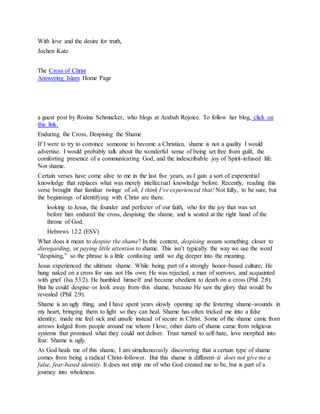
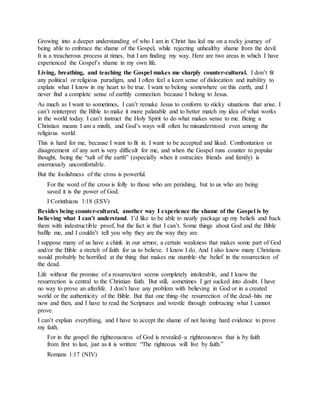
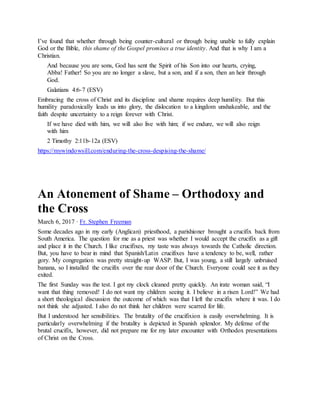
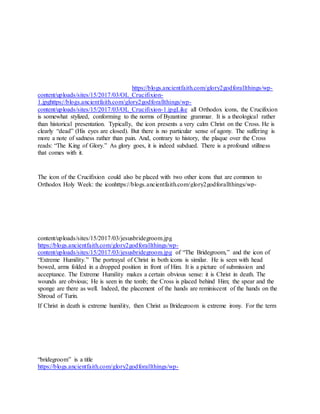
![content/uploads/sites/15/2017/03/extremehumility.jpghttps://blogs.ancientfaith.com/glory2godfo
rallthings/wp-content/uploads/sites/15/2017/03/extremehumility.jpgfor Christ associated with
His coming in glory (Matt. 25 ff.) The Orthodox focus on the Bridegroom, however, is a Holy
Week devotion, a call to repentance. On the first three days of Holy Week we sing with great
solemnity:
Behold, the Bridegroom comes at midnight!
And blessed is the servant whom He shall find watching,
And unworthy is the servant whom He shall find heedless.
Beware, therefore, O my soul.
Do not be weighed down with sleep, lest you be given unto death,
And lest you be shut out of the kingdom.
But rouse yourself crying, Holy, Holy, Holy art Thou, O God.
Through the Theotokos have mercy on us!
This is the Great Irony: the Great becomes small; the Rich becomes poor; the Mighty becomes
weak; the Author of Life enters death; the God of All becomes the servant of all. This same irony
lies at the heart of the Christian way of life. It strikes down every pretense to power and exalts
the emptiness of humility as the fullness of being.
Of great note, however, is the absence of pain and torture in this presentation. The theme of the
Orthodox account of Christ’s suffering and death is that of bearing shame and mockery. You can
search the texts of Holy Week for the word “pain,” and come up with almost nothing. The
mocking and the shame, however, color everything.
The same is largely true of the New Testament as well. When St. Paul describes Christ’s self-
emptying (kenosis) on the Cross, he says that Christ “became obedient to death,” and adds, “even
death on a Cross.” The point of the “even” is not that the Cross is painful above all pain, but that
the Cross is shameful above all shame. There are no gospel accounts of characters taking some
sort of masochistic pleasure and delighting in Christ’s pain. However, there are repeated
descriptions of His humiliation. The purple robe, the crown of thorns are not unique images of
pain, but torturous bits of mockery.
All of this runs counter to the penal theories of the atonement. In those theories, Christ is
punished on our behalf. It is His pain and suffering as sacrificial victim that come to the fore.
What Western (cf. Spanish) art did to the Crucifixion, Western rhetoric did to the atonement. The
Reformation did nothing to change this other than to avoid its artistic presentation in Churches (it
looked too “Catholic”).
But what role does shame play within an understanding of the atonement? It is, I think, essential,
though hard for us to understand. America has been described as a shame-based culture where
shame itself is not acknowledged (it’s too painful). It helps if we understand the nature of shame
itself.
Shame is the natural response to broken communion. [Kaufman, The Psychology of Shame,
1996, pp. 32-33] The relationship of communion with others is the very essence of safety and
comfort. Its most primal expression is the bond between mother and nursing infant. Face-to-face,
the child is held and nurtured. There the child is comforted and protected. [footnote] Every later
experience of union draws on this primal experience. It is not accidental that the ultimate
relationship, that of union with God in Christ, is described precisely in the language of face-to-
face.](https://image.slidesharecdn.com/jesuswasashamefulsufferer-200222145625/85/Jesus-was-a-shameful-sufferer-69-320.jpg)
